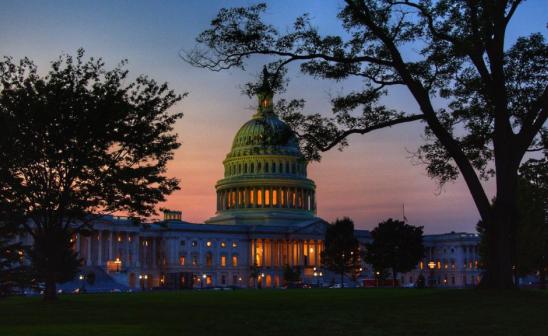Does the filibuster enhance debate in the Senate? New research says no

This story was originally published by the Harris School of Public Policy. Read the story on their site here.
Filibuster may hurt rather than help legislative deliberation, according to new empirical analysis
As legislative gridlock continues to dominate American political discourse, many point to the filibuster as a key culprit. Its defenders, meanwhile, insist that the Senate rule plays a vital role in stimulating healthy public debate and discussion. New research from the University of Chicago Harris School of Public Policy provides the first empirical evidence to refute that claim.
Despite a large body of literature on the history and role of the filibuster, no prior research has evaluated its effects empirically. In a new working paper, Prof. William Howell and Shu Fu, a teaching fellow in the Division of the Social Sciences, track the volume and quality of legislative discussion across the history of the filibuster.
Their findings are consistent: Changes in the filibuster rarely coincide with marked differences in legislative discussion and debate; and where differences are observed, they nearly always suggest that the filibuster impedes—rather than facilitates—robust deliberation.
“For too long, we’ve had a tendency to defend or condemn the filibuster without evidence, instead relying on anecdotes colored by our existing biases,” said Howell, the Sydney Stein Professor in American Politics at Harris Public Policy and director of the Center for Effective Government. “By revealing that the filibuster does not increase discussion on the floors of Congress, this research shifts the burden of proof to those who continue to argue otherwise.”
Drawing from the Congressional Record, the authors analyzed the patterns of legislative discussion before and after a specific set of changes that weakened the filibuster. The analysis revealed the following:
- The 1917 adoption of cloture, which limited the ability of a single senator to hold the floor indefinitely, did not produce a measurable change.
- Similarly, very little changed in 1975, when the Senate lowered the number of votes needed to invoke cloture from two thirds to three fifths.
- This pattern can be traced back to the late 19th century, when a procedural loophole known as the “disappearing quorum” allowed the minority party to block voting on new legislation. Eliminating this precursor to the modern filibuster actually increased legislative discussion.
Conversely, the authors also analyzed the period following Mitch McConnell’s assumption of Senate Republican leadership in 2007, which coincided with a sharp increase in the use of the filibuster. Senate floor speeches declined by approximately 14 to 28 percent when these new norms took hold, and the number of days spent debating landmark legislation did not increase.
“We now have evidence that our modern norm of subjecting nearly every bill to a filibuster does not encourage legislative discussion,” said Howell, who also chairs the Department of Political Science at UChicago. “If anything, it erodes it.”
“Our modern norm of subjecting nearly every bill to a filibuster does not encourage legislative discussion. If anything, it erodes it.”
Finally, the authors analyzed the effects of the so-called “carve-out” in 2013, which eliminated the filibuster for federal and district court appointees. After the change, the overall volume of Senate speeches remained constant, and actually increased by 6 percent for appellate court nominees.
By focusing primarily on patterns of public discussion on the Senate floor, the research does not exhaust all potential measures of the filibuster’s effects on legislative discussion. The paper notes that it is possible that the filibuster alters the tone or quality of floor debates, or that it affects the volume of speech and time devoted to legislative discussions occurring in committees or behind closed doors. Additional research is needed to examine these possibilities.
“Still, it’s noteworthy that we find so little evidence of changes in patterns related to floor speeches precisely at critical moments in the filibuster’s history,” said Howell. “These findings suggest that weakening the filibuster won't degrade the Senate’s commitment to—such as it is—legislative deliberation.”
 THE UNIVERSITY OF CHICAGO
THE UNIVERSITY OF CHICAGO


